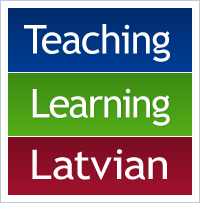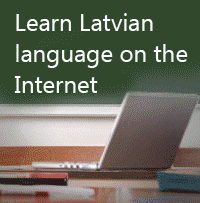The State language policy
The official language of the Republic of Latvia is Latvian.
This is stipulated by Article 4 of the Constitution of the Republic of Latvia and Article 3 of the State Language Law.
The state language status of the Latvian language means that it is the common language of the society of the Republic of Latvia. The official language of the state is the language used in public communication, it is the teaching language, the language of public names, signs and writings, the language of the institutions and the language used in work and business environments and services. It is the duty of public authorities to ensure that its status as the state language is respected in practice.
Only a purposefully developed, nurtured, and enriched language can fully perform the functions of a state language. Therefore, the purposeful maintenance of the quality of the Latvian language by the state is an important task, while state language policy is a necessary component of domestic policy strategy.
The aim of language policy is to ensure the sustainability, linguistic quality, and competitiveness of the Latvian language – the state language of the Republic of Latvia and an official language of the European Union – in the Latvian and world language market, as well as its impact on the Latvian cultural environment.
In accordance with Article 24 of the State Language Law, “The State ensures the development of the state language policy, making sure it includes scientific research of the Latvian language, that it is protected and taught, while empowering the economic importance of the language, and the promotion of individual and public recognition of the language as something of national value”.
The current state language policy in Latvia is formulated in the “Guidelines of the State Language Policy in 2015–2020”.
4 ways to achieve the goals set in the state language policy have been determined for the aforementioned period:
- by ensuring the legal status of the state language (the implementation of the state language law and other regulatory enactments, international co-operation and other tasks);
- the state language education policy (the relevance, accessibility and attractiveness of the methodology for teaching Latvian and the necessary teaching materials, as well as the training of specialists and teachers in the field to strengthen the status of Latvian as a state language);
- the scientific research and development of the Latvian language (support for linguistic monitoring studies, scientific research of the Latvian language and development of language technology, including – the development of databases and the Latvian language national corpus, terminology and publishing of academic and popular scientific publications);
- ensuring that the public participates in the implementation of the state language policy and the development of the Latvian language (public involvement and participation, the development of Latvian language culture and the promotion of such a cultural environment where Latvian and Liv languages can prosper, as well as other tasks).
“State language policy guidelines for 2005–2014”.
How the Latvian language obtained its state language status.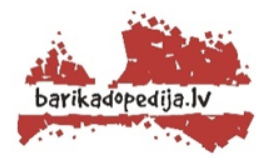
A wide range of materials that detail how Latvian became an official state language can be found on the website www.barikadopedija.lv created by the Latvian journalist and public figure Andrejs Cīrulis and his like-minded colleagues. The website details the history of the Third awakening, and you can find information about whom, when and how began the efforts that led to Latvian being recognized as the official state language of Latvia. A chronological summary of articles published in the press can be found here – http://www.barikadopedija.lv/raksti/Latvie%C5%A1u_valoda,_Likums_par_valsts_valodu.
European Federation of National Institutions for Language, EFNIL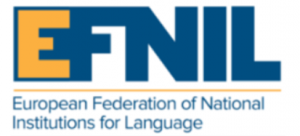
The Latvian Language Agency has been a member institution of the European Federation of National Institutions for Language (EFNIL) since 2004. Latvia is also represented in this organization by the University of Latvia’s agency “Institute of the Latvian Language of the University of Latvia”.
The European Federation of National Institutions for Language, EFNIL is an independent intergovernmental body that brings together language policy organizations from the EU Member States and the European Economic Area whose goals are state / official language policy protection, maintenance and / or its implementation. EFNIL ensures the exchange of information between these Member State institutions, promotes the study of the official languages of the European Union and develops a unified approach to the acquisition of native and foreign languages with the aim to preserve linguistic and cultural diversity.
The European Federation of National Institutions for Language was established by the member institutions in a General Assembly on 14 October 2003 in Stockholm.
Every autumn, EFNIL organizes a conference and an annual General Assembly in one of the Member States. The conferences are thematic and dedicated to the planning and implementation of language policy in the European Union and other countries. The General Assembly reviews organizational matters, approves EFNIL’s budget and work program for the coming year, and elects a Steering Committee.
Cavtat, 2020
The 18th annual EFNIL conference “Language in the corona crisis” in Cavtat, Croatia was scheduled to take place on 30 September and 1 October 2020 but was postponed indefinitely due to the coronavirus pandemic. An online conference was held instead on the initially planned dates. The program of the conference is available here: http://efnil.org/conferences/dubrovnik-2020
Tallinn, 2019
The 17th Annual EFNIL Conference “Language and Economy: Language Industries in a Multilingual Europe” was held in Tallinn from 9 to 11 October 2019.
The conference was organized by the Estonian Language Institute (Eesti Keele Instituut), the Estonian Language Council (Eesti Keelenõukogu), the Ministry of Education and Science (Haridus- ja Teadusministeerium), the Tallinn City Council (Tallinna Linnavalitsus), the Mother Tongue Society (Emakeele Selts) and the Directorate-General for Translation of the European Commission. The program and the papers read at the conference are available here: http://efnil.org/conferences/tallinn-2019
Amsterdam, 2018
The 16th annual EFNIL conference “Language variation: a factor of increasing language complexity and a challenge for 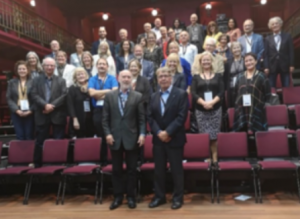 language policy within Europe” was held in Amsterdam from 10 to 12 October 2018.
language policy within Europe” was held in Amsterdam from 10 to 12 October 2018.
The conference was organized by the Dutch Language Union (Nederlandse Taalunie) and the Dutch Language Institute (Instituut voor de Nedelandse Taal). The program and the papers read at the conference and photos of the event are available here: http://efnil.org/conferences/amsterdam-2018
Mannheim, 2017
The 15th annual EFNIL conference “National language institutions and national languages” was held in Mannheim from 5–6 October 2017.
The conference was held by the German Language Institute. The program and the papers read at the conference are available here: http://www.efnil.org/conferences/mannheim-2017
Taking part in the conference were the director of the LVA Jānis Valdmanis and LU professor Ina Druviete who presented the paper “The Role of National Language Policy Institutions in the Implementation of Law on Official State Language in Latvia”.
Warsaw, 2016
The 14th annual EFNIL conference “Stereotypes and linguistic prejudices in Europe” was held in Warsaw from 20–21 September 2016.
The conference was held by the Academy of Poland. The program and the papers read at the conference are available here: http://www.efnil.org/conferences/warsaw-2016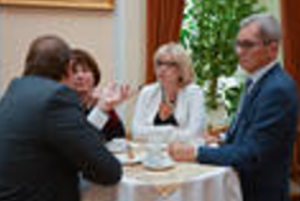
The papers read at the conference were published as a collection of writings which is available here: http://www.efnil.org/documents/conference-publications/warsaw-2016/EFNIL%202016%20Warsaw.pdf
Helsinki, 2015
The 13th annual EFNIL conference “Language use in public administration – theory and practice in the European states” was held in Helsinki on 7–9 October 2015.
The conference was held by the Finnish Language Institute. The program and the papers read at the conference are available here: http://www.efnil.org/conferences/13th-annual-conference-helsinki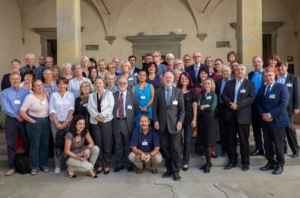
The papers read at the conference are available online here: http://www.efnil.org/conferences/13th-annual-conference-helsinki/proceedings
Florence, 2014
The 12th annual EFNIL conference “Language use in University Teaching and Research – Past, Present and Future” was held in Florence from 27 to 28 September 2014.
The Florence resolution is available here: Language use in University Teaching and Research – Past, Present and Future
Vilnius, 2013
The conference dealt with the topics of translation and interpretation in Europe (this was the 11th Annual Conference on Translation and Interpretation in Europe) and was held from 27–28 September in Vilnius, because the Republic of Lithuania served as acting Presidency of the European Union in the second half of 2013.
While simultaneously organizing the meeting of EFNIL member institutions, the Lithuanian Language Institute also organized the conference “United in Diversity – Languages for Mobility, Work Needs and Citizenship” within the context of the European Day of Languages (25–26 September 2013).
Budapest, 2012
The 10th Annual EFNIL conference “Lexical Challenges in Multilingual Europe” was held in Budapest (Hungary) from 24 to 25 October 2012. During the conference, the participants adopted the Budapest resolution on the Challenges of Lexical Resources and Technology in a Multilingual Europe to promote the development and availability of bilingual digital dictionaries and to promote the development of novel vocabulary processing technologies.
The Budapest resolution: On the Challenges of Lexical Resources and Technology in a Multilingual Europe.
London, 2011
The 9th annual EFNIL conference “The Role of Language Education in Creating a Multilingual Europe” was held in London (UK) from 25 to 26 October 2011.
Thessaloniki, 2010
The 8th annual EFNIL conference “Language, Languages and New Technologies: ICT in Language Services (language technologies, languages and the Internet, digital media and language acquisition)” was held in Thessaloniki (Greece) from 2 to 4 November 2010.
About two-thirds of the world’s Internet users do not use English on a daily basis, however, most Internet resources and information available in electronic media are available only in the English language. Therefore, the issue of linguistic diversity is becoming increasingly important not only in everyday communication, but also in the electronic media.
Dublin, 2009
The 7th annual EFNIL conference “The Relationship between Official Languages and Regional and Minority Languages in Europe” was held in Dublin (Ireland) from 4 to 6 April 2009.
The working sessions of the conference examined such important Latvian language policy issues as:
- language coexistence theory in legal and sociolinguistic contexts,
- language policy practice and issues in European countries,
- current issues with the attitude towards the state language with minority and regional languages in different countries,
- the need to monitor European languages and its implementation,
- effective cooperation opportunities between EU institutions working in the field of language policy.
The Dublin resolution: On the Relationship between Official Languages and Regional and Minority Languages in Europe.
Lisbon, 2008
The 6th annual EFNIL conference “Language Use in Business and Commerce in Europe” was held in Lisbon (Portugal) from 12 to 14 November 2008.
The Lisbon Resolution: Language Use in Business and Commerce in Europe.
Riga, 2007
The 5th annual EFNIL conference and General Assembly was held in Riga from 12 to 13 November 2007. It was organized by the Latvian Language Agency in cooperation with the President’s State Language Commission. The topic of this conference was “European and National Language Policies”.
One of the issues discussed during the conference was the competitiveness of language, the most vivid example of which is the growing role of English in business, education, and science, which undoubtedly weakens and threatens the positions of other languages. This problem exists throughout Europe, especially in those EU Member States with a relatively small number of native speakers (Swedish, Finnish, Danish, Latvian, Lithuanian, Estonian, Slovak, Slovenian, Maltese languages).
The second issue highlighted during the conference was the increasing migration and mobility of the population of the European Union, which poses new challenges for language policy – how to ensure the integration of immigrants and their ability to communicate in the official language of the country they are in. Therefore, it is important to create a language policy that would not only promote the learning of the most widely used languages, but also preserve and develop the use of the so-called “small” languages, because a threat to one of Europe’s smallest languages also means a threat to the others, and only by establishing a common language policy can it be possible to fight against the dominance of the economically stronger languages. However, since the linguistic situations in the Member States are different, it is difficult to come up with universal recommendations for language protection, so, it must be concluded, that national policies are best understood and planned at a national level.
The Riga resolution: On European and National Language Policies.
Madrid, 2006
The 4th annual EFNIL conference was held on 19–21 November 2006 in Madrid (Spain). The topic of the conference was “Pluricentric Languages in Multilingual Europe”.
Brussels, 2005
40 representatives from 26 states (no more than two official representatives from each country can attend) participated in the annual EFNIL conference “Plurilingual Europeans – Foreign Language Learning and Language Politics” in Brussels (Belgium) on 24–25 November 2005.
In consideration of the importance of preserving Europe’s linguistic and cultural diversity and supporting the acquisition of foreign languages, EFNIL discussed the Brussels Declaration “On Language Learning” on 25 November 2005. The declaration is based on the principle that the European Union is a rapidly growing information society that needs security and guarantees in place that ensure linguistic diversity, which is at the heart of Europe’s cultural diversity. EFNIL members supported not only the learning and use of their own (official) language, but also the learning of other European languages. The goal is to have multilingual citizens in a multilingual Europe. Specific recommendations were developed to achieve this goal.
The Brussels declaration: On language learning.
Paris, 2004
The 2nd annual EFNIL conference was held from 8 to 9 November 2004 in Paris (France).
Stockholm, 2003
EFNIL was founded in 2003 in Stockholm (Sweden). It is the largest organization in Europe, and it unites the institutions responsible for the development of state (official) languages in the Member States of the European Union.
The first General Assembly and Conference was held from 13 to 14 October 2003 in Stockholm. The conference addresses two main issues: Linguistic Functional Domains, Language Planning and National Languages and Language Legislation and National Language.

